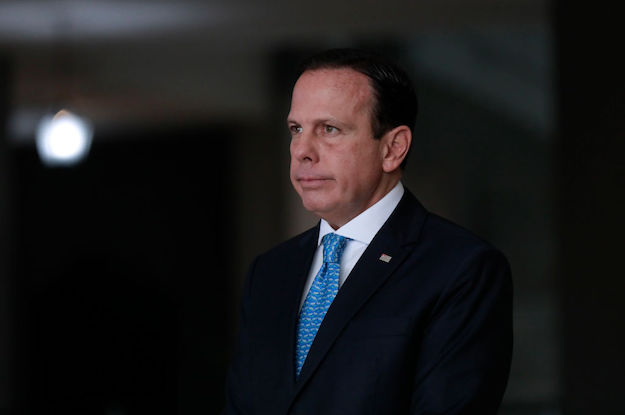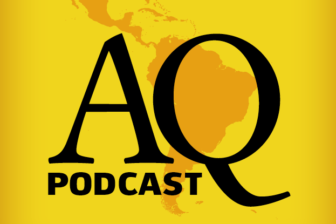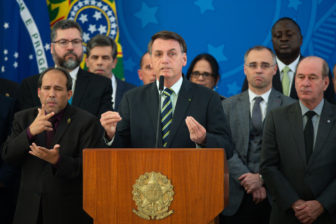SÃO PAULO – Brazil’s Jair Bolsonaro is facing the most trying period of his presidency, with falling approval numbers and a fumbled response to COVID-19 mounting pressure on his government. But deeply entrenched animosities within the opposition, and tactical considerations ahead of presidential elections in 2022, make a united political front against him unlikely, for now.
Established opposition parties’ unwillingness to unite around a single centrist candidate in 2018 contributed to Bolsonaro’s election. But a year and a half into his turbulent presidency, it seems that the parties have not learned much from their mistakes. Despite the fact that three out of five Brazilians think the president is mishandling the pandemic – and amid a growing sense that the country is rudderless as a massive economic crisis approaches – there is little to suggest that a “broad democratic front” that unites ideologically disparate parties is at hand.
To be sure, calls for such a show of unity have relied on some recent signs of cooperation within the democratic camp. All of Brazil’s living former foreign relations ministers, for example, recently published an op-ed in several of Brazil’s major newspapers to denounce what they called the “shameful subservience (to the United States) and irrationality” of Bolsonaro’s foreign policy. Last year, all the former environmental ministers published a similar manifesto against the president, followed by matching initiatives by ministers of education and justice. In every case, the ministers in question spanned the ideological spectrum. And when São Paulo Senator José Serra, one of the center-right PSDB’s founding members, announced that he had introduced a bill to create a universal basic income, he made sure to point out that he was building on an earlier proposal by former Senator Eduardo Suplicy, a founding member of Brazil’s leftist Workers’ Party.
Yet such initiatives are unlikely to do much to mitigate the deep skepticism that exists among opposition leaders and their voters. Election considerations for 2022 further complicate matters. In fact, Sérgio Moro’s decision to resign as justice minister in April, leveling serious accusations against the president on his way out, is likely to have hindered efforts to unite the anti-Bolsonaro camp. After all, the Workers’ Party would most likely prefer to face a weakened Bolsonaro in 2022 than a moderately popular Vice President Hamilton Mourão (who would become president if Bolsonaro were to be impeached) or Moro himself.
This dynamic also explains why an impeachment proceeding against Bolsonaro is unlikely to begin in the immediate future. Rodrigo Maia, the president of Brazil’s Lower House, will only initiate proceedings if he knows there are sufficient votes for passage – something that, for now, is not in the cards. Aware of this schism, Moro adopted a remarkably conciliatory tone towards the PT during his resignation speech, lauding the Lula and Dilma Rousseff governments for not intervening in police operations.
Such niceties will not change the overall dynamic preventing a strategic alliance, even if temporary, between parties opposed to Bolsonaro. Many on the left see Moro and other former Bolsonaro allies such as João Doria and Wilson Witzel as little more than polished versions of Bolsonaro’s authoritarianism (sometimes called “bolsonarista gourmet”). On the right, many former Bolsonaro supporters say they would reluctantly vote for him again if he faced the Workers’ Party in a run-off.
Moro, in particular, is despised by those who believe Lula was unjustly disqualified from running in 2018 at a time when he was leading in the polls. The so-called Lava Jato leaks last year only strengthened doubts about the legality of Lula’s conviction on corruption charges, making Moro an even greater enemy in the eyes of many of his voters than Bolsonaro himself. They are thus unlikely to consider the former judge a lesser evil compared to the president.
Two pragmatic governors who have sought to promote cross-partisan cooperation, and who may come to play a role in efforts to build a democratic alliance against Bolsonaro in 2022, are Maranhão’s Flávio Dino and Rio Grande do Sul’s Eduardo Leite. Though representing very different perspectives (Dino is part of Brazil’s Communist Party, which is communist in name only, and Leite is part of the center-right PSDB), the two maintain an ongoing public dialogue and could attempt to appeal to voters who reject Bolsonaro and who are also tired of the squabbles involving Moro and Lula. While any talk of a progressive joint Dino-Leite ticket is premature – a lot depends on municipal elections scheduled for October this year – Dino recently said that dialogue across ideological lines was necessary. He cited Lula’s decision to pick José Alencar, a business tycoon, as his nominee for vice president when he ran in 2002.
One additional consideration that makes the creation of a broad national pact more difficult is the absence of above-the-fray statesmen and women who are sufficiently respected by both left and right to lead such a process and build an appealing narrative outside of ideological convictions. There are a few former Supreme Court judges who could in theory fit the bill – such as Nelson Jobim – but they lack the national visibility required.
All that is good news for Bolsonaro – and explains why impeachment may not happen at this stage. That said, the likely severity of the coming economic crisis could still force a premature exit. By contrast, while the 2022 elections are, politically speaking, still light years away, a deeply divided opposition means that it’s also too early to count Bolsonaro out.









